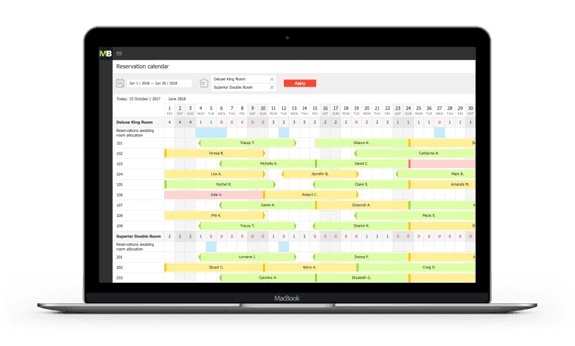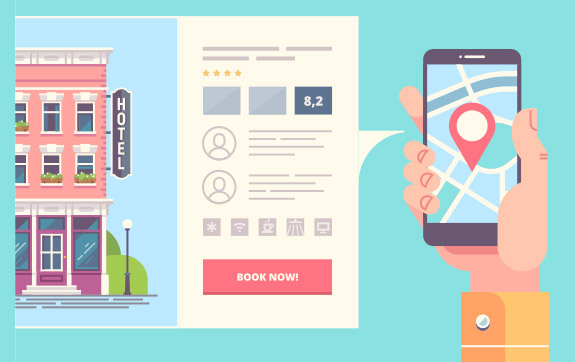The role of GDS and CRS in Evolution of Hotel Reservations Online
Since the end of the 1990s, the online-based reservation systems have become an additional booking potential for hotels. International hotel chains usually use group-based reservation systems, while individual hotels use cooperative ones. And in the catering trade, bookings can now be booked professionally via the POS systems (Point of Sale). There are also hotel reservation systems that only ensure reservations to consumers or business travelers.
As an electronic medium for the travel services distribution, GDS (Global distribution System) and CRS (Computer Reservation System) are important. Reservation systems cost a revenue share as a commission. This commission can be 4-6% of the sales result. However, this is far exceeded by strong systems such as in the case of CRS (15% as of March 2015) and GDS up to 25%.
CRS and GDS Summary
CRS collects information in databases about booking options, rates and availability of arrangements, trains, buses, flights, ferries, hotels, cruises, car rentals, vacation packages, tickets of all kinds and other products. Hotel data is delivered from hotel databases to computer reservation systems. The database is linked to these various service providers through which the respective travel agent’s inquiries (e.g., online travel agent (OTA)) are forwarded and reconciled to the providers of the services. CRS takes over the billing of commissions and provides data for the travel agent’s back office. There are, among others, the following computer reservation systems: Amadeus, Axess, Holidex, Micros, Trust Utell, Saber and Worldspan.
GDS are global databases that manage global reservation data, while the term CRS is mostly used by domestic groups such as HRS. With the GDS, it is possible to book several service providers with one booking transaction, as the system bundles the services of various tourism providers.
Travel agency commissions/CRS-GDS allowances
For the bookings the travel agencies charge different commissions of up to 15% – 25% to the partners (hotels etc.). The travel agencies in turn pay monthly fees to the CRS. 480,000 classic travel agencies are currently connected via GDS. GDS can be very expensive – with up to 25% commission. On the other hand, more expensive rates are accepted, which bring the house international clientele. GDS systems offer Amadeus, Axess, Worldspan, Saber and Galileo. For the hotel sector, there are GDS chain codes. Nationally, these systems are also called CRS systems.
Insight into the CRS/GDS History
Online tourism industry has a tremendous magnetism. There is a mixture of high-tech and positive emotions from traveling. At some point, it is quite interesting to find out what was there at the very beginning, who stood at the origins and how it all worked.
The history of commercial aviation begins with the first flight carried out in the United States between the cities of St. Petersburg and Tampa on January 1, 1914. The line did not operate long, only 4 months. The first pilot was Tony Jannus, and the first commercial passenger was the mayor of St. Petersburg, Abram C. Pheil. The flight was only 34 km long and took 23 minutes. At some point, commercial airlines started thinking of selling tickets and controlling aircraft loading.
In the 30s of the 20th century, reservations were made manually at least 30 days before departure. Big milestone was achieved in 1952, when American Airlines developed and introduced Magnetronic Reservisor into the booking process. Prior to its implementation, all reservations were made in the same office by filling out a so-called flight card. To purchase a ticket, an agent had to call a specific reservation office and request information on booking for a specific flight. At the booking office, an employee went to a special room, took out a flight card and informed the agent if there were any free places. If booking was required, the employee simply attached a bill to the map.
The first Reservisor prototype was developed by Charles Amman and presented to the president of American Airlines in 1944. It was an electric-mechanical device, repeating the functionality of the board of flights, which was introduced earlier under the “sell and notify” program.
Experimental exploitation of reservation was held in the Boston airline office in 1946. The continuation of the booking development resulted in the creation of the second version of Magnetronic Reservisor in 1956. Its implementation gave a significant increase in the speed and quality of service. For comparison, in 1952, the office served 1000 flights with the possibility of selling for 10 days in advance, whereas access to booking information took 1-2 seconds. In 1956, it became possible to work with 2,000 flights on 31 days in advance and access to information took less than 0.5 seconds.
The question of the storage of information about passengers remained open. For this purpose, Amman, together with IBM, developed the Reserwriter, where passenger information was stored on punched cards, which were later replaced with punched tapes. The next step in the development of booking systems was an occasional, but at the same time, historic meeting of American Airlines president and IBM sales president, Blair Smith on the Los Angeles – New York flight in 1953. The result of their conversation and the subsequent visit of IBM to the AA office was a signed contract for $30 million to develop a fundamentally new booking system – SABER.
Despite solid funding, the first CRS was not SABER, but ReserVec, which was created by order of Trans-Canada Airlines (now Air Canada). The ReserVec I system was developed for a modest amount of $4 million and made its first reservation in 1963. In December 1964, actually a year after the launch of ReserVec, SABER began its work as CRS software for American Airlines.
In the following years, technology began to develop more rapidly. In 1971, the Apollo reservation system was created on request of United Airline. In 1972, the first stage of the Sirena-1 reservation system was launched in the USSR
In 1977, Videcom International together with British Airways, CCL (Computer Communications Ltd) and British Caledonian developed the Travicom system – a multi-access reservations system. Travicom was very widespread in the UK in 1987 – 97% of UK bookings went through it.
In 1987, as a counterweight to American CRS and the sale of its own services, a group of European airlines invested in the development of CRS Amadeus. This development was conducted by order of Iberia, Air France, Lufthansa and SAS.
In the same year, a consortium of 9 European airlines including British Airways, KLM, Alitalia, Swissair, Austrian Airlines, Olympic, Sabena, Air Portugal and Aer Lingus, launches Galileo.
As a logical continuation of the story, in 1988 the company Travicom changed its trademark to Galileo UK. In 1988, British Caledonian was taken over by BA and in the same year Galileo UK was sold to Galileo International.
In 1990, Delta Airlines, Northwest Airlines and TWA invested in the creation of Worldspan to sell their services worldwide.
In 1993, a rather interesting event happened when an IT company entered the airline market. This is a PRA Solutions, which was created by Accenture and worked in the market of developing financial systems for airlines. But the market only saw the echo of this event in 2000, when PRA Solutions bought the Open Skies platform from HP. The very next year, PRA Solutions changed its name and became Navitaire.
In 1996, at the other end of the world, CRS was launched in China, which later became the basis for the national booking system Travelsky.
In the 90s, the development of the Soviet Siren-2 system went in two directions. Two companies were created that began to develop alternative Sirena branches. In 2002, in South America, the company KIU System Solutions produces the same name GDS, which has become popular among South American airlines.
In January 2016, Amadeus completed a deal to purchase Navitaire for $830 million. Thus, Amadeus has become stronger in the market of not only regular transportation, but also in the market of Low Cost carriers.
As a result, now the main players in the global market are SABER, Amadeus and Travelport, as well as regional systems such as Siren and TravelSky.
Functional evolution
Booking systems evolved on the basis of their tasks, the needs of the business of airlines and agents, and subsequently the companies-developers of these systems. CRS solved problems that were specific to airlines. It was necessary to store information about flight schedules, fares, as well as all information about the reservation in relation to a passenger.
To increase sales and expand their agency network, airlines needed a different class of systems, commonly known as GDS. Now GDSs provide access not only to aviation content, but also to offers for the sale of hotels, car rentals, train tickets, cruises, etc.
Despite the fact that the development of systems from the point of view of distribution went from CRS to GDS, i.e. solved the goal of maximizing customer reach; in recent years, a different trend has begun to appear on the market. And the pioneer here was the company Lufthansa. In 2015, the airline company announced that the cost of booking via GDS will be 16 EUR more expensive than in the case of direct connection to the airline’s reservation system. This caused a big debate in the market, many arguing about whether Lufthansa would go to this step and how it would affect its sales.
In fact, now this collection is introduced. Tickets are sold more expensive through the GDS and cheaper on the airline’s own website and in the case of direct connection to the agent. Will this be a ubiquitous trend? This can be beneficial for very large carriers, but small regional players will still work through the GDS. Now GDSs are building up a pool of products, which they distribute through agents: from mono-product to multi-services of tourism industry.
Hotel Reservation Portals: Pros and Cons for Hoteliers
Booking portals are an integral part of the hotel landscape. Online bookings become more and more common. The presence on Internet portals ensures a higher occupancy rate for hoteliers. However, the trend also brings disadvantages.
According to a study by the Heilbronn Institute for Applied Market Research in 2016, 70% of hoteliers from each corner of the world used booking portals as an additional distribution channel. But even if the hotel utilization can be improved by the listing on different on-line platforms, the profitability decreases with the enterprises, if up to 15% commission become due per successful booking.
Advantages of online booking portals
Hotel booking portals are an important distribution partner for the hotel industry, but as important as external agents in hotel sales are. The market power of some dominant booking portals must not lead to an abuse of market power in terms of commission levels and contractual terms.
Booking portals have the clear advantage of a long reach. Because the more hotels listed on a platform, the more users visit the portal – travelers from abroad will also be aware of the hotels. This range is not always possible with own sales channels – with booking portals rental hosts can also reach potential customers who have not heard of their properties so far abroad.
Moreover, booking portals help enormously to bring the last-minute actualities about the hotels at short notice with many bookings coming via hotel booking portals the day before check-in.
Disadvantages for hoteliers
The large amount of hotels that can be found on individual portals leads to an enormous price war within the industry. Guests are often looking for the cheapest price and tempting bargains. This means that hoteliers have to offer reasonably priced room rates in order to be competitive. In addition, of course, a commission must be paid for each successfully mediated room. The result is financial losses or empty room. Commissions of up to 15% are not appropriate, as the profit margin is reduced too much.
Another disadvantage of booking portals is that hoteliers cannot communicate with future guests during the booking process. The travel booking process is carried out exclusively via a booking portal, which is also responsible for answering the questions during the booking process. The first personal contact to build up a long-term guest relationship is very important for a hotelier.
Possible Alternatives
Meanwhile, there are also hoteliers who try to go other ways than the booking portals. Hotel directories such as hotel-ami.com are characterized by the fact that hoteliers benefit from a high range, manage the booking process themselves and thus no commissions are due. Managing Director of hotel-ami.com says that their guest directory currently lists more than 400000 hotels worldwide, with a special focus on Germany, Austria and Switzerland. Hoteliers who use their directory pay only a one-time annual fee for the listing. Commissions for the room bookings are not due. Guests go directly to the booking system of the desired hotel via this website and a host immediately receives the room request and can process it personally as well as communicate with the guests. Reservation of the hotel room is free, payment for the stay is made directly in the hotel.




















